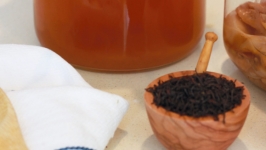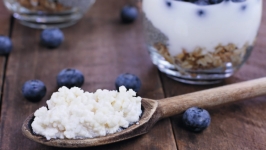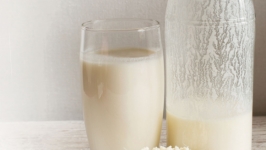Kom One, Kom All
Fizzy, healthy kombucha is easy to make at home
Love it or hate it, there is no denying that a weird ancient fermented tea has gained mainstream popularity over the past few years. Kombucha is fizzy, energizing and, according to some studies, helps improve digestion and tame hangovers (through supporting liver metabolism). With sales cresting $1.5 billion annually, this darling of the health beverage industry is taking market share from sodas and energy drinks. But what is it about kombucha that has created this stir?
Tangy and refreshing, traditionally brewed kombucha is made with a purchased or inherited blob-like SCOBY (symbiotic culture of bacteria and yeast) to get the fermentation going. The resulting beverage has a bit of a sour punch because it is an acetic acid ferment, similar to vinegar, yet with a lot less acidity (about 1% vs. 4–8% in vinegar).
Originating in Asia, some speculate it was consumed by the very first Emperor, Qin Shi Huang Di, where it was called the “Tea of Long Life” and the “Tea of Immortality” before spreading around the world via the Silk Road. The name “kombucha” is reportedly from fifth-century Japan, where a physician named Kombu treated the Emperor with the “cha,” or tea. In Russia, it has been popular for centuries where it is known as “chayni grib” or “tea mushroom.” Europe has seen a few waves of kombucha popularity and it likely migrated to the U.S. in the early 1960s, where it was passed around counterculture communities until it landed in Los Angeles as a commercial product in 1995 with the launch of GT’s Kombucha.
These days, with a price tag that can rival fancy coffee, it’s a relief to know how easy and inexpensive it is to make at home with a few simple quality ingredients. But first, let’s dive into why anyone would want to drink “tea vinegar.”
Though studies have been done, many benefits from drinking kombucha are anecdotal. How it will impact your body is unique to each person. The most commonly reported benefits of drinking this ferment include increased energy, improved digestion and “feeling good.”
Research into the human microbiome is revealing that each person has their own world of microbes that live inside and on their bodies. While it isn’t clear which specific microbes are better, it is clear that a diversity of microbes is a vital element of a healthy gut. If nothing else, kombucha contains organisms and nutrients in a living form that can be immediately utilized by the human body to help create that diversity in the gut.
Some nutrients in kombucha include: vitamin C, B vitamins (B1, B6, B12), gluconic and glucuronic acid, acetic acid, osmophilic yeast and amino acids. However, because each SCOBY and tea has slight variations, the exact nutritional and microbial composition will be different in each batch made.
Like all fermented foods, kombucha also creates trace amounts of alcohol as a preservative, similar to the amounts present in fruit juice. While it is not intoxicating, those who wish to minimize the impact may want to dilute their kombucha with water or juice. Children and pregnant women have enjoyed kombucha without ill effects but, as with all foods, the choice is personal. I always say, “Trust YOUR gut!”









